Mick McDuckface, as you may recall, is our lame duckling. For a couple of weeks he appeared to be coping, scrambling along behind his siblings and enjoying the freedom that dabbling in the water gave him. Then things seemed to take a turn for the worse and he became less and less active. He would sit quietly in the shade of a big weed or stone, not moving to join the rush when I appeared to feed or water the ducks. While his siblings grew ever bigger, noisier and began to grow proper feathers, poor little Mick seemed to be fading away.
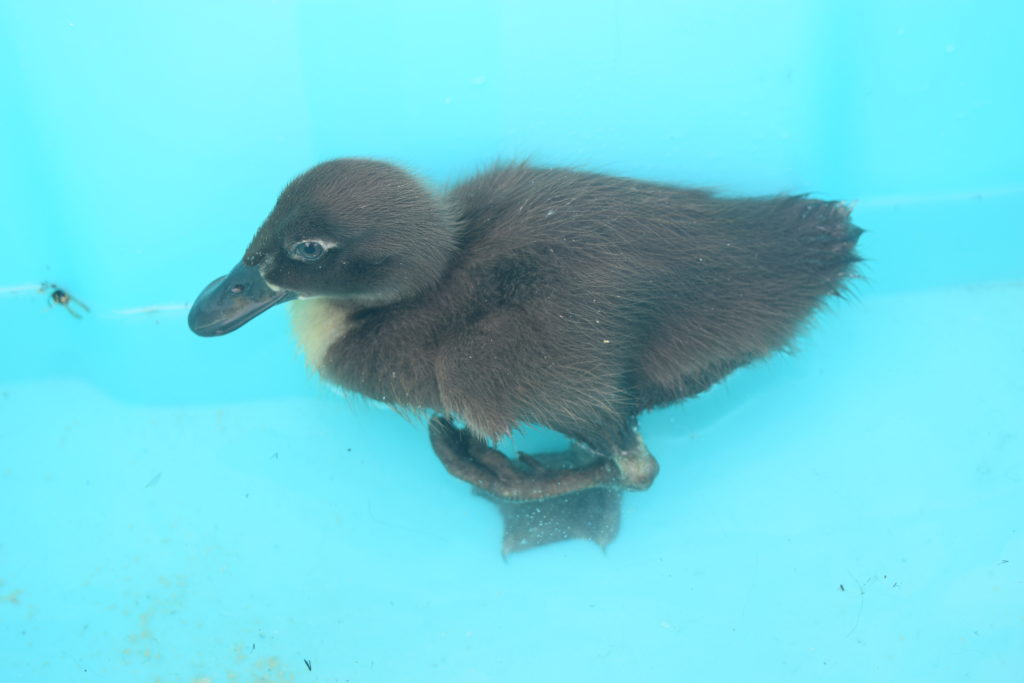
Mick’s poor little gammy leg was folded against his body
We decided that if left he would probably die. Having a house duck was messy and time-consuming when we had Dick van Duck. We now have three dogs and only Poppy, the dog of the blog, is guaranteed to love and nurture a small, fluffy thing. Minnow is almost guaranteed to shake anything small to death and Teddy would lollop and smother, without even realising what he had done.
At last, we got to the point where doing nothing was not really an option, so Mick was brought indoors.
Poor little mite was ravenous. He sat on my lap and took great shovelling beaks full of feed, only stopping when his mouth became blocked and claggy and he had to slurp and swill about in the water bowl I had balanced next to the feed bowl on my knee.
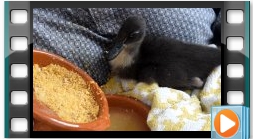
Feeding time video is here
I think he was so hungry that he forgot I was the terrible creature who had stolen him away from his family. Very soon my lap was covered in feed, water and duck poop. He was a very messy little lame duck.
Closer examination of his bad leg revealed that his foot was only half the size of his good foot, with the toes bunched together in a stiff, useless claw. His ankle joint was knobbly and twisted in toward his body, clutched against his keel and very inflexible.
For a few days our routine was a strange mix of cuddles, frenzied feeding, (him mainly, with me grabbing meals as and when) gentle massage of his foot and leg, regular swimming exercise in the sink in the barn and attempts to encourage him to spread his toes, flex his ankle and put weight on his leg.
At first, he seemed too weak to stand up for any length of time. He was content to sit on my lap while I massaged and played with his lifeless little foot. I read that niacin deficiency could hamper the proper development of poultry feet, so we took to grinding up vitamin B tablets and adding them to his food. In a couple of days, the ‘thumb’ of his foot had more than doubled in size and his foot had grown at an astonishing rate. The webbing between his toes was still far narrower than on the other foot and there was little movement in the joints. I continued to play gently with his toes, ankle and leg.
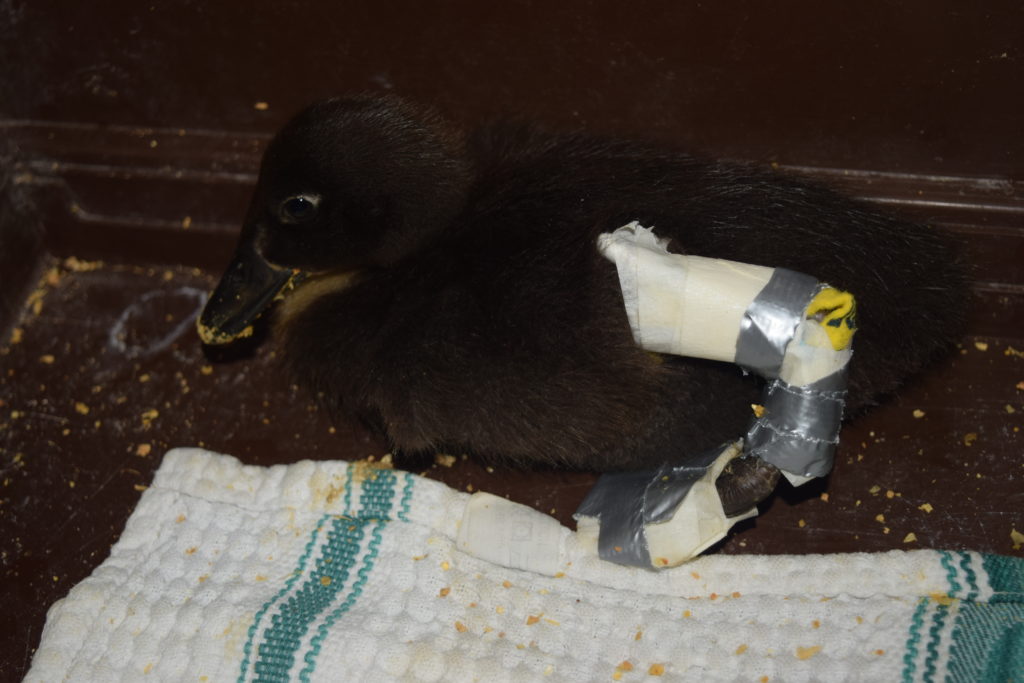
One of the unsuccessful splint/boot combos. Note the use of Duck Tape!
Encouraged by various videos on Youtube, I made him a little boot to keep his toes splayed for a few hours at a time. He was very good at wiggling free of it, so ever more Heath Robinson contraptions ensued until we had a duckproof boot system in place.
Thinking back to when I broke my ankle badly, I remembered the physio taking care to warm and then massage the joint before gently pushing it to move. He would support the leg and foot while applying just enough pressure to ease the joint a little further than the day before. It was painstaking work, but I ended up with a fully functional ankle.
Splinting Mick’s leg straight was hopeless. The more I looked at the ankle, the more convinced I became that the joint was dislocated and could not articulate like his other one. I decided that massaging and encouraging the joint to flex as much as possible was probably the way to go.
After a week, Mick was tentatively stretching his leg out behind him when he was sitting on my lap. His toes were no longer bunched together uselessly, but there was no muscle tone there. He would not put any weight on it at all, in spite of my best efforts to encourage him. I even made a sling out of one of Geoff’s old socks and hung him from the tap over the sink, hoping it would work like the old baby bouncers we hung from door frames to encourage the children to learn to kick their legs and stand on them.
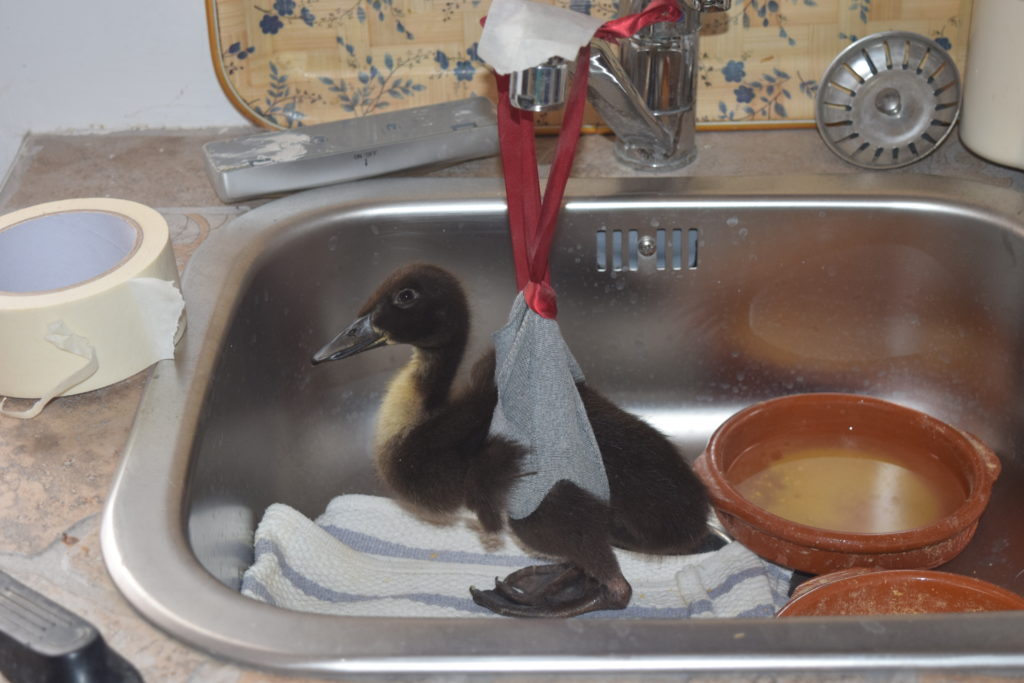
Hanging in a sock in the sink proved cute, but useless
Nothing was working. In desperation, I took him to our vet.
Angel said that as long as Mick was growing, it would be best to wait and see if he found a way to get about. His bones were definitely not aligned properly, but without an x-ray and surgery, it was impossible to do anything. Mick was too tiny to risk either, so he suggested coming back in three weeks’ time for a progress check. He warned me to keep an eye open for any raw patches, if Mick started to walk on his ankle.

When he first came in, he could hardly peep over the top of the tub!
Mick started to hop a little. His normal, big, flappy foot adopted a position more or less under the center of his body and he would hop a little, always sideways or backwards, before falling into his water bowl or crashing into an obstacle and sinking to the floor.
‘Looks like he’s going to need a scooter and reversing mirrors,’ we said, ‘but how will that work out in Duckville?’
Mick continued to stuff his little face with huge enthusiasm, half drown me with his gargling and sifting, cuddle up and doze while I stroked his little ducky beak or played with his foot. He pooped mightily at an astonishing and impressive rate, keeping me busy with endless old tea towels to wash and dry, ready for his outpourings of stinky duck stuff.
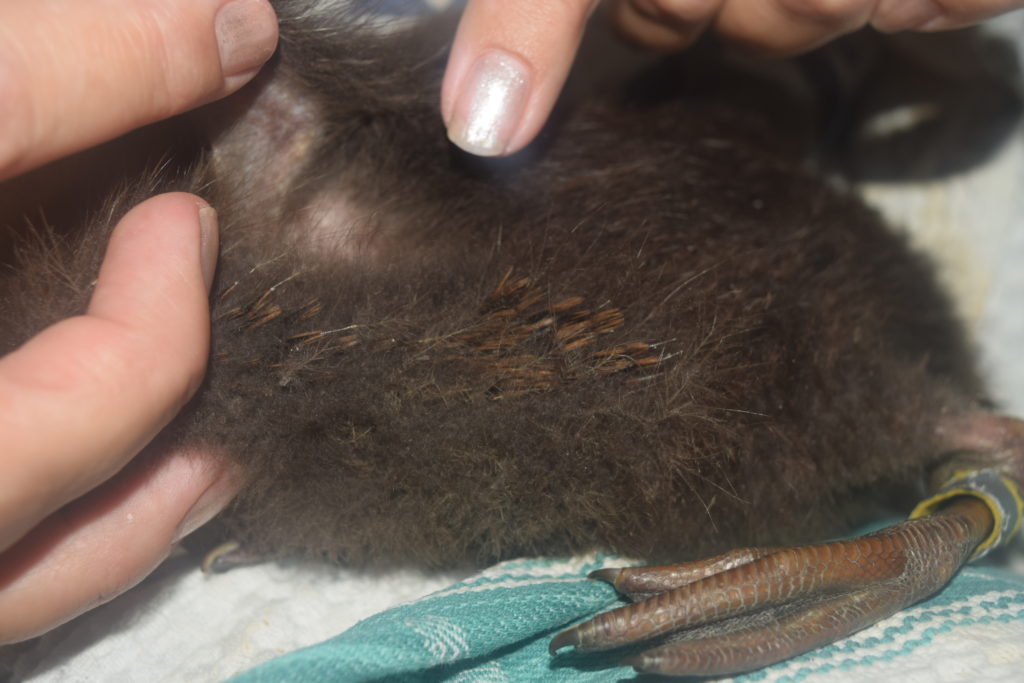
Two or three weeks behind his siblings. Mick is beginning to grow proper feathers
His foot was now almost the same size as his healthy one, but it stubbornly refused to move unless I helped it. His hopping was coming along nicely and he had virtually doubled in size. We decided that if he was happy to hop, we should let him have more space to practise.
The last few days we have allowed him to hop about in the courtyard. It is relatively easy to keep the dogs away from him in there and he has plenty of space to stretch his leg and exercise. His hopping came along by leaps and bounds, as it were, and he could cover a fair distance at speed, backwards or sideways until he crashed into a plant pot.
‘He won’t cope in Duckville if he can only go backwards,’ I worried. The only other alternative to having a permanent house guest (and the dog-related stress and extra mopping it would involve) is Bacofoil and some home-grown oranges. Angel was not convinced that anaesthetic and surgery would be successful on such a little creature and we cannot afford it in any case.
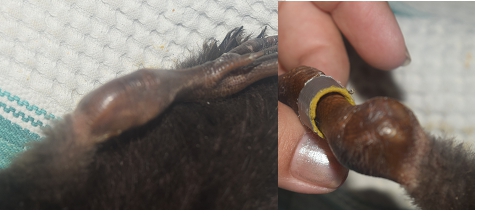
Micks healthy one on the left is knobbly but straight. The dodgy one (right) is somehow dislocated, we think.
I decided to try tempting Mick to hop forward. He has developed a taste for canonigos – lambs lettuce, I believe – so I grabbed a couple of sprigs and sallied forth.
Unbelievable! The speed at which he hopped, forward, to snaffle the treat was nothing short of astonishing. I lured and made encouraging noises as he raced after me around the courtyard, gobbling the greenery as fast as his monopod style and stuffed little crop would allow. OK, so he crashed into a chair leg and sat down after a few minutes, but he was clearly well able to go forward if suitably motivated.
Today we are going to weigh him, give him a pep talk and then restore him to the bosom of his family. I hope his siblings will be happy to have him back and that the adults will not reject him. I do not anticipate the whole fatted calf and mighty feasting scenario, but if they just nudge over to let him take his place, I shall be happy.
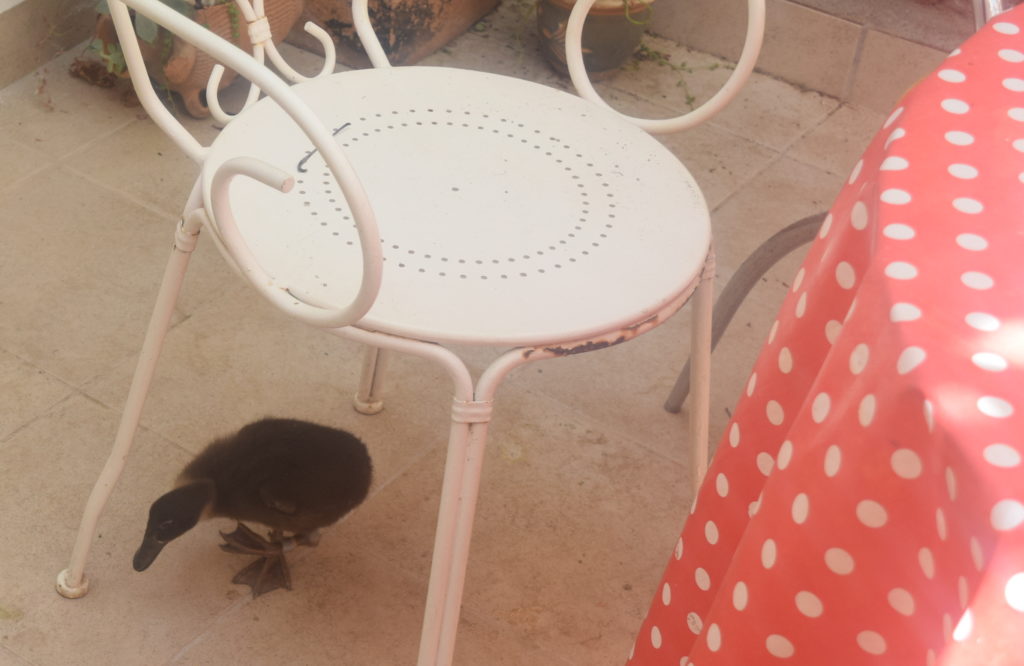
Mick’s curious gait and voracious appetite can be seen here

